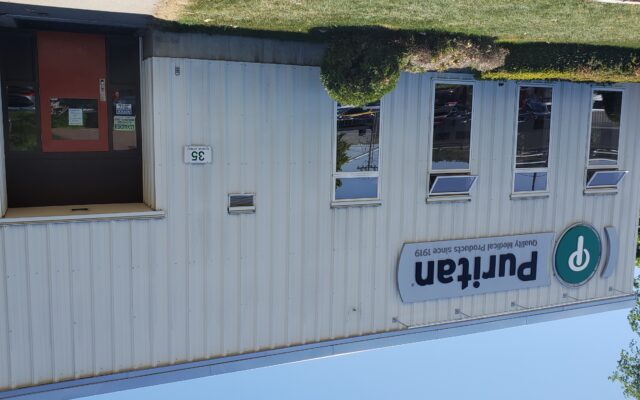
Swab maker’s Tennessee expansion lets it access a workforce larger than Maine’s
By David Marino Jr., Bangor Daily News Staff
A Piscataquis County company’s expansion into Tennessee will allow it access to a workforce larger than all of Maine’s as it keeps expanding its production of crucial COVID-19 testing swabs.
Puritan Medical Products’ new plant in an old auto parts warehouse in Orlinda, Tennessee, will be the fourth for the century-old Guilford company that is the primary domestic producer of the nasopharyngeal and foam swabs used in COVID-19 testing. It will also be Puritan’s first plant outside of Maine following a year of rapid expansion.
With a capacity to produce up to 200 million swabs a month, the Tennessee plant will be integral to the company’s future operations, according to Puritan officials.
While Puritan had long been known in medical circles and in Maine, the pandemic catapulted it into the national spotlight. When the pandemic began shutting down the country in March 2020, Puritan was the only American company that produced the swabs necessary for COVID-19 testing, which the nation needed to scale up quickly.
The Orlinda facility will be the company’s third new plant since the pandemic hit. Puritan opened two new plants in Pittsfield last year, and it expanded production at its Guilford facility.
The company is planning for a partial opening of the Orlinda plant around November with a full opening around January 2022. It is expected to create more than 600 jobs over the next five years.
Puritan began looking to expand outside New England around October 2020 after the federal government encouraged it to spread out the geography of its swab production, Puritan General Manager Scott Wellman said.
The federal government has now invested about $400 million in the company, including $150 million for the Tennessee plant, to bankroll its rapid expansion. By comparison, total sales for Puritan and its sister company, Hardwood Products Co., were $55 million in 2019, according to court documents.
Puritan looked at about 30 sites across Texas, Tennessee and Wisconsin, Wellman said. It was trying to find a site with access to a large workforce with the skill set needed to staff the plant, along with access to a robust power grid to help run the machinery and equipment.
The Orlinda location at 3150 Berry Drive was the only site that satisfied all those requirements, Wellman said. Auto parts distributor Dorman Products previously used the site as a warehouse.
Puritan has added about 900 new jobs in the last year, Wellman said. While the company has been able to fill those jobs, it would be difficult to find the workers to staff another rural Maine facility, he said.
“We’re operating mostly in rural areas, so there isn’t a huge population base to pull from,” Wellman said. “You just get to a point where people don’t want to drive hours and hours to get to work.”
By contrast, the Orlinda factory is about 40 minutes from Nashville and a little more than a half-hour from Bowling Green, Kentucky. More than 2 million people live in the metro areas for both cities, hundreds of thousands more than in the entire state of Maine.
The expansion will cause Puritan employees to travel both ways between Maine and Tennessee, with several Orlinda employees training in Maine over the summer, Wellman said. There are no plans for any of Puritan’s Maine employees to permanently relocate to Tennessee, he said.
Wellman did not rule out future expansion, but said the current focus was on training and optimizing the workforce of the company’s three Maine plants and the new one in Orlinda.
While vaccines have become central to eradicating COVID-19, many continue to be tested for COVID-19 every day. More than 125,000 tests were conducted in Maine alone from April 15-29, according to Maine Center for Disease Control and Prevention data.
Testing for COVID-19 and other illnesses will not go away anytime soon in the U.S., Wellman said, and the company expects it to be widely used for traveling and employment in the future. Puritan also expects home testing to become increasingly prevalent.
The company was forced to shift most of its sales domestically due to the Defense Production Act, but it has begun to export more swabs overseas, including to regions where the COVID-19 vaccine is less widely available than in the U.S.
About 56 percent of American adults are partially or fully vaccinated, among the highest rates in the world.
As it expands nationwide and internationally, Wellman said the company is still proud to be based in Maine. He said its response to the worst pandemic of the century reflected not just on the company but on the state’s ingenuity as a whole.
“I think we’ve shown the country that Maine is willing to do whatever needs to be done,” Wellman said. “It changed, we reacted. And in the end, we just weren’t willing to fail in any aspect of what we were doing.”